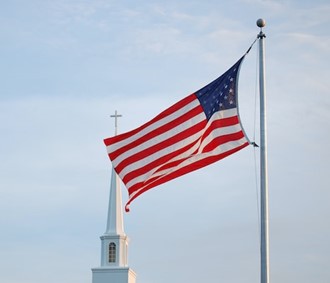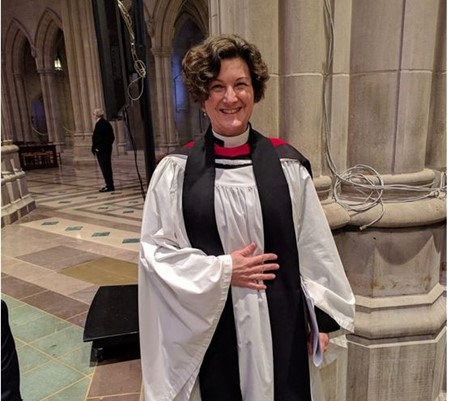The Rev. Canon Leslie Nuñez Steffensen is canon to Bishop Suffragan for the Armed Forces and Federal Ministries of the Episcopal Church, and a member of the Presiding Bishop’s staff. In the following article, Leslie discusses how the Church provides guidance and support to those who have served.
Since the earliest days of the United States military, chaplains have provided spiritual and pastoral support for the nation’s military personnel and their families. Through their continued dedication, they’ve helped to boost morale, provide counseling, and guide soldiers’ spiritual growth in times of hardship.
The Episcopal Church in particular has played this supportive role for a long time, having offered deacons and priests to serve as chaplains in the United States Armed Forces since the Revolutionary War. Today, the Church continues to offer its guidance, thanks in part to the efforts of Canon Steffensen and her cohorts.
The Role of Episcopal Federal Chaplains – Serving Soldiers at Home and Abroad
The Federal Chaplain service makes up a vital, but often overlooked, part of the wider support structure that contributes to the United States Armed Forces. Beyond providing spiritual and moral support for soldiers and their families, the Episcopal Federal Chaplains also provide support in a more tangible way—by creating a sense of community and camaraderie among service personnel, regardless of their backgrounds.
Canon Steffensen says that by working at the community level to offer worship services, chaplains can transcend boundaries and provide guidance to everyone. This includes providing support for those suffering from lingering mental health issues like depression, anxiety, and PTSD. The chaplain service works far beyond the scope of a traditional base setting.
Episcopal chaplains also serve in Veterans Administration hospitals and in the Federal Bureau of Prisons, where they can serve vulnerable communities. Additionally, as military service members, Federal Chaplains are also deployed to combat zones to provide moral and emotional support to the soldiers, sailors, and airmen putting their lives on the line.
Canon Steffensen explains that chaplains are not issued weapons and are not allowed or expected to take part in combat operations. Their role is to provide spiritual resilience support.
How Episcopal Clergy Members Can Become Chaplains
Interested seminary students or current members of the Episcopal clergy can join the Federal Chaplain service by undergoing a relatively straightforward process. In most cases, they’ll first speak with the Bishop Suffragan for the Armed Forces and Federal Ministries, who will provide them with further information about the responsibilities of the job.
Canon Steffensen says that to be considered for the role of chaplain, applicants must be postulants in seminary, or already ordained Episcopal clergy with a minimum of two years in full-time parish ministry. Furthermore, hopeful chaplains must meet minimum physical requirements in order to enter the military. Applicants will undergo careful screening and must pass all applicable background checks before earning an “endorsement” for Federal Chaplain service. If they pass all requirements and are sworn in to the military, priests will go on to Officer and Chaplain training before reporting to their first duty assignment.
 Contributions to the Chaplain Service
Contributions to the Chaplain Service
Canon Steffensen reports that as the Executive Officer, she acts as a right hand to the Bishop Suffragan, shepherding applicants and planning annual chaplain training. Considering her own military background and experience as a priest, she is uniquely qualified to oversee the daily activities of the chaplain service.
Canon Steffensen explains that she attended Officer Candidate School before enrolling in the Navy and Marine Intelligence Training Center in 1990. She then spent four years as an active-duty Naval Aviation Intelligence Officer before going on to start a family and raise three children.
After leaving active duty, Canon Steffensen became a Volunteer for Mission, teaching at Msalato Theological College in Tanzania. As she worked to complete her own seminary training and earn her eventual priesthood, she turned her focus to administrative duties and has since risen to serve as a vital hand to the Episcopal Chaplains.
The Impact of Episcopal Chaplains
Canon Steffensen notes that there’s no denying the Episcopal Federal Chaplain’s invaluable role as an asset to the United States Armed Forces. Although many military members do not identify as Episcopalian or even as religious at all, Episcopal chaplains provide a vital foundation of support for all military personnel, no exceptions.
By providing a safe and non-judgmental setting for all service members, including those who identify as LBGTQ+, Episcopal chaplains can act as a constant source of comfort and guidance to those in need. With the help of Canon Steffensen and her team, the Episcopal Federal Chaplains are sure to continue making a positive impact in the lives of the nation’s military members.
Final Thoughts
The Episcopal Church has long served as a source of inspiration and moral guidance for the American military. Through its contributions of clergy members to the Federal Chaplain service, it has proudly supported veterans, active-duty servicemen and women, and those housed in the federal prison system. And, thanks to the professionalism and deep faith of the Episcopal Chaplains, they will continue the Episcopal witness on the ”Frontlines of the Jesus Movement” for the foreseeable future.








